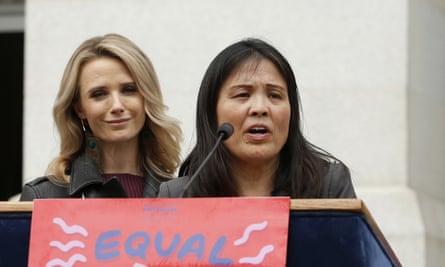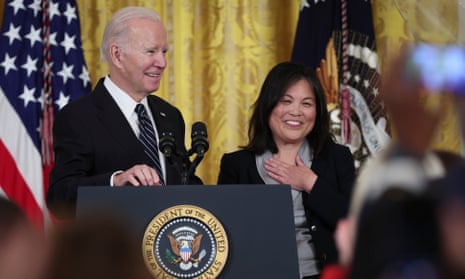Julie Su has come a long way since she first made headlines in 1995 when she, then just 26 years old, was lead lawyer for 72 Thai workers who were essentially kept in slavery, toiling 18 hours a day at a sweatshop just outside Los Angeles.
Last week Joe Biden nominated Su to be secretary of labor, the government’s top labor position, a move that many labor, immigrant and women’s groups vigorously cheered, while a few business groups – but not many – opposed the nomination. Now some supporters fear that she might have a hard time mustering the needed votes in the Senate to be confirmed.
Su, the 54-year-old daughter of immigrants, has served as deputy labor secretary since 2021, having been narrowly confirmed 50 to 47. “I’m a huge fan,” said Liz Shuler, president of the AFL-CIO, the nation’s main labor federation. “I can’t imagine someone more prepared. She’s been working hand in glove with Marty Walsh,” the current labor secretary, who is leaving to head the National Hockey League Players’ Association.
“She has the expertise,” Shuler added. “She’s a hard worker. She’s creative. We know that she will defend workers, especially the most vulnerable. This pick is a home run.”
When Biden nominated her, Su explained “my mom came to the United States on a cargo ship” from China because she couldn’t afford a passenger ticket. Born in Madison and growing up outside Los Angeles, Su went to Stanford and Harvard Law School, and then became a lawyer for an LA-based advocacy group Asian Americans Advancing Justice.
“At Harvard, we were taught to think like lawyers, but we did not learn to think like human beings,” Su often says. In 2001, Su, who is fluent in Mandarin and Spanish, won a MacArthur Foundation “genius” grant for her innovative work as a workers’ rights advocate.
Immediately before becoming deputy secretary, she headed California’s labor and workforce development agency under Governor Gavin Newsom, and before that she oversaw California’s labor enforcement under Newsom’s predecessor Jerry Brown. She was known for aggressively cracking down on restaurants, garment factories and car washes that cheated workers out of wages. She also went after trucking companies that improperly classified their drivers as independent contractors in part to deny them minimum wage and overtime pay protections.
Kent Wong, director of the UCLA Labor Center, said: “She did extraordinary work in reaching out to unions and community partners, in strengthening enforcement of wage laws and in really identifying the pernicious problem faced by so many low-wage workers of color who were routinely becoming victims of wage theft.”

As California’s top labor official, Su expanded apprenticeship programs to train workers without college degrees and helped run the business/labor Future of Work Commission. That panel proposed ideas to help the workforce of the future, such as creating a “California Job Quality Index” to define high-quality jobs and help workers know who are good employers offering good benefits.
When Su was under consideration to be deputy secretary of labor, Allen Zaremberg, president of the California chamber of commerce, praised her “professionalism” and said: “Julie Su has always been open to the views of employers and is willing to listen to the concerns of the business community.”
So far the US Chamber of Commerce and most other business groups have not taken a position on Su’s nomination. But the International Franchise Association was quick to oppose her.
“Deputy Secretary Su has been consistently hostile to small businesses throughout her career,” said Michael Layman, the franchise association’s senior vice-president of government relations. He faulted her for supporting California law AB5, which made it harder for businesses to classify workers as independent contractors, a law that upset Uber and Lyft.
Lorena Gonzalez, president of the California Labor Federation, said she had long been impressed with how Su maintained good communications and relations with business. “She brought a perspective that labor law enforcement isn’t just good for workers, it’s also good for high-road businesses that are doing things right.”
In 2017, when Su was California’s labor commissioner, she told me in an interview: “I passionately believe that our enforcement is good for employers. The legitimate businesses that are complying with the law are frustrated with the bad guys that aren’t complying.”
Su was widely criticized over the billions of dollars that California’s unemployment insurance paid out due to fraud during the pandemic. But Su’s defenders noted that other states also experienced plenty of such fraud, that California’s unemployment insurance system was a mess long before Julie Su and that the nationwide rush to keep the pandemic-induced unemployed from going hungry made unemployment screening less rigorous than usual.
The Franchise Association said that “based on her record, she does not deserve a promotion from a largely operations role to the [department’s] principal policymaker”. It urged the Senate to reject her just as it rejected David Weil, Biden’s nominee to head the labor department’s wage and hour division.
Weil, who headed that division under President Barack Obama, was voted down 53 to 47. Business groups lobbied hard against Weil because he had pushed to stop gig companies, like Uber and Lyft, from what he said was improperly classifying their drivers as independent contractors.
“From my own experience, I know what a razor’s edge the Senate is right now,” Weil said in an interview. “It’s all about two senators’ willingness to support her,” in a reference to Joe Manchin and Kysten Sinema, senators who were elected as Democrats but have voted with Republicans against progressive actions.

Weil said Su would have a lot to do as labor secretary, although if the Senate fails to confirm her, she would remain as acting secretary of labor. “There are two or three major rules that have to be finalized,” Weil said, “and that gets harder and harder as you get closer to an election.”
He mentioned rules to make it harder to misclassify workers as independent contractors and to increase the threshold, currently $35,500, below which employees would have to be paid overtime if they work over 40 hours a week.
Erica Smiley, executive director of Jobs with Justice, a labor rights group, praised Su for being innovative. “She’s been on the cutting edge of trying new stuff,” Smiley said. “She has an appetite for experimenting with policies that will benefit everyday people.”
Normally the National Labor Relations Board – which is independent from the labor department – handles cases in which companies are accused of illegally shutting stores or operations in retaliation for unionization efforts. Pointing to Amy’s Kitchen’s decision and close its food prep operation in San Jose and lay off 331 workers as that facility faced a union drive, Smiley suggested that Su have the labor department provide emergency assistance to workers who lose jobs in such situations, just as other federal agencies provide disaster relief. She urged Su to speak out against companies like Starbucks that she said were engaged in aggressive union-busting.
Biden and Congress have enacted three far-reaching laws that will create hundreds of thousands of jobs – on infrastructure, semiconductor investment and transitioning to clean energy. Many worker advocates are looking to Su to use her sway as secretary to make sure the bulk of those new jobs are good, middle-class jobs, and many hope they’re unionized jobs, too.
One of Su’s biggest champions is Sara Nelson, president of the Association of Flight Attendants and someone Senator Bernie Sanders urged Biden to nominate as labor secretary. Right after Su was nominated, Nelson tweeted: “Fantastic news for the country.”
“I was very clear from the very beginning that we already had someone eminently qualified for this position,” Nelson said. “She’s way more qualified for this job than I would be, depending on what you think the job should be, in terms of understanding policy and how to use it as a tool to help average Americans. She wants to be a strong adviser to a president who wants to be the most pro-worker president ever.
“This is not about one person filling a position,” Nelson added. “It’s about all of us working together to lift standards for the American people. I know that she will be fighting the good fight from the inside, and I’ll be fighting the good fight from the outside.”
Some worker advocates voiced concern that Su is not a White House insider the way Walsh was and the way former labor secretary Tom Perez was under Obama. That could make it harder for Su to get the White House’s and Office of Management and Budget’s blessing to finalize important regulations.
But the AFL-CIO’s Shuler voiced confidence: “She’s very persuasive, relentless and persistent. It’s hard to ignore Julie Su.”
